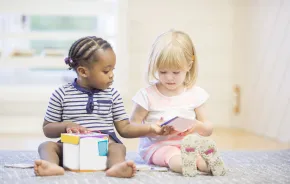Some children excel at adding and subtracting, while others display genius at the local gym, scoring points every time. Harvard professor Howard Gardner suggests that kids draw upon “multiple intelligences,” including linguistic, logical-mathematical, spatial, bodily-kinesthetic, musical, interpersonal, intrapersonal and naturalist. Even very young children display a tendency toward one or more aptitudes.
Genetics and brain development contribute to natural gifts, but so does environment, according to Thomas Armstrong, educational expert and author of In Their Own Way: Discovering and Encouraging Your Child’s Multiple Intelligences. “Intelligences are not fixed,” Armstrong says. Parents should act as facilitators, without pushing. “It’s not appropriate to give a preschooler formal reading lessons,” he says. Instead, expose her to a “wide range of experiences related to all the intelligences.
Watch your child to figure out her abilities, ready to adjust your ideas about her future. You can use the information below to identify and explore your child’s intelligence — or explore a new one altogether:
Linguistic intelligence. A preschool-age child with a knack for words enjoys reading with parents. Nursery rhymes and poems catch his ear. Picking up foreign languages with ease, he’ll chat with anyone who will listen.
Play: Play rhyming games or write letters in sand together. Make up silly jokes, or head to the library and share The Random House Book of Poetry for Children by Jack Prelutsky.
Famously “word smart”: Maya Angelou, Jorge Luis Borges, William Shakespeare
Logical-mathematical intelligence. This kid loves getting experimental, solving questions like “What happens when Jell-O and milk combine?” Number sense comes early, and she’ll add and subtract cookies — without prompting.
Play: Keep a logical little mind busy for hours with UNO, Go Fish and other card games, or give her a broken clock and a screwdriver. Learn about levers at the Pacific Science Center and read David M. Schwartz’s How Much Is a Million?
Famously “math smart”: Stephen Hawking, Ada Lovelace, Leonardo da Vinci
Spatial intelligence. Skilled at drawing, this child takes a paper-and-pencil approach to problems. Special spatial abilities lead to plenty of coloring and creating. He loves puzzles and painting, mazes, maps and gadgets.
Play: Provide construction toys or encourage her to design buildings and clothing. Check out the family room at the Seattle Art Museum, then read I Spy Shapes in Art by Lucy Micklethwait.
Famously “art smart”: Frida Kahlo, I.M. Pei, Vincent Van Gogh
Bodily-kinesthetic intelligence. This on-the-go child hates sitting still and loves sports, running and large-muscle movement. She’s a clever mimic of classmates and has excellent fine-motor coordination in preschool classes.
Play: Get her outside, rain or shine. Sign up for Mommy ‘n’ Me gym, dance or soccer; take her out to a Mariners ballgame. Encourage fine-motor handiness with sewing and crafting, and act out the fast-moving We’re Going on a Bear Hunt by Michael Rosen.
Famously “body smart”: Jackie Chan, Lily Tomlin, Cal Ripken Jr.
Musical intelligence. This kid loves tunes, whether singing “Little Red Wagon,” clamoring for a favorite CD or shaking maracas. He easily remembers melodies and lyrics and may be extra-sensitive to loud noise.
Play: Make beautiful music together with handmade instruments, using everyday items such as a pop bottle, dried beans and tape. Visit Soundbridge or attend one of Seattle Symphony’s Tiny Tots concerts, then read Zin! Zin! Zin! A Violin by Lloyd Moss together.
Famously “music smart”: Aaron Copeland, Yo-Yo Ma, Norah Jones
Interpersonal intelligence. Born with a high “EQ” (emotional quotient), this child enjoys a good discussion and debate. She loves playing with pals, solving problems, being the leader, and she easily picks up on nonverbal cues.
Play: Turn your house into play-date central and enroll in classes that encourage imaginative, interactive play. For dramatic interactions, try a trip to the Seattle Children’s Theatre. For a friendly read, pull out Leo Lionni’s Little Blue and Little Yellow.
Famously “people smart”: Abigail Van Buren, Oprah, Martin Luther King Jr.
Intrapersonal intelligence. Following his own road, he gets more out of playing alone. Often lost in thought, he needs downtime to recoup from play group.
Play: Provide options for independent projects, or help him keep a journal with paper, pen or photographs. Carve out a “nook” in your home for personal reflection and share Munro Leaf’s The Story of Ferdinand.
Famously “self smart”: Mohandas Gandhi, Anne Frank, Emily Dickinson
Naturalist intelligence. This child loves animals, sometimes even preferring pets to people. She adores the outside world and collects rocks and other outdoor items; check those pockets for live treasures!
Play: Go on walks in Discovery Park or start a kid-size butterfly garden. Head to the Seattle Aquarium to contemplate wild things, then snuggle at home with the book Miss Rumphius by Barbara Cooney.
Famously “nature smart”: Jane Goodall, Rachel Carson, Charles Darwin
Lora Shinn is a Seattle-based writer, children’s librarian and mother.









